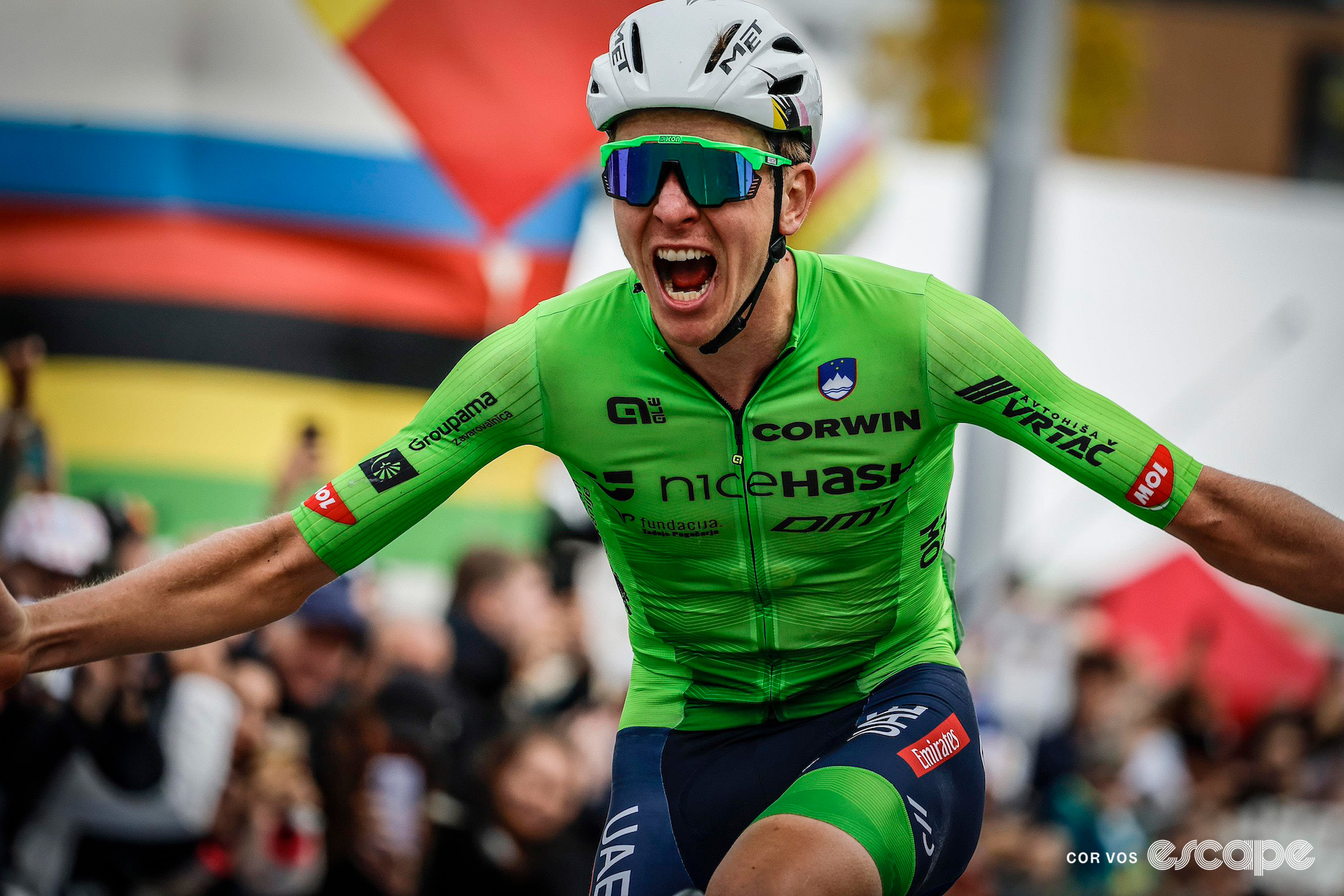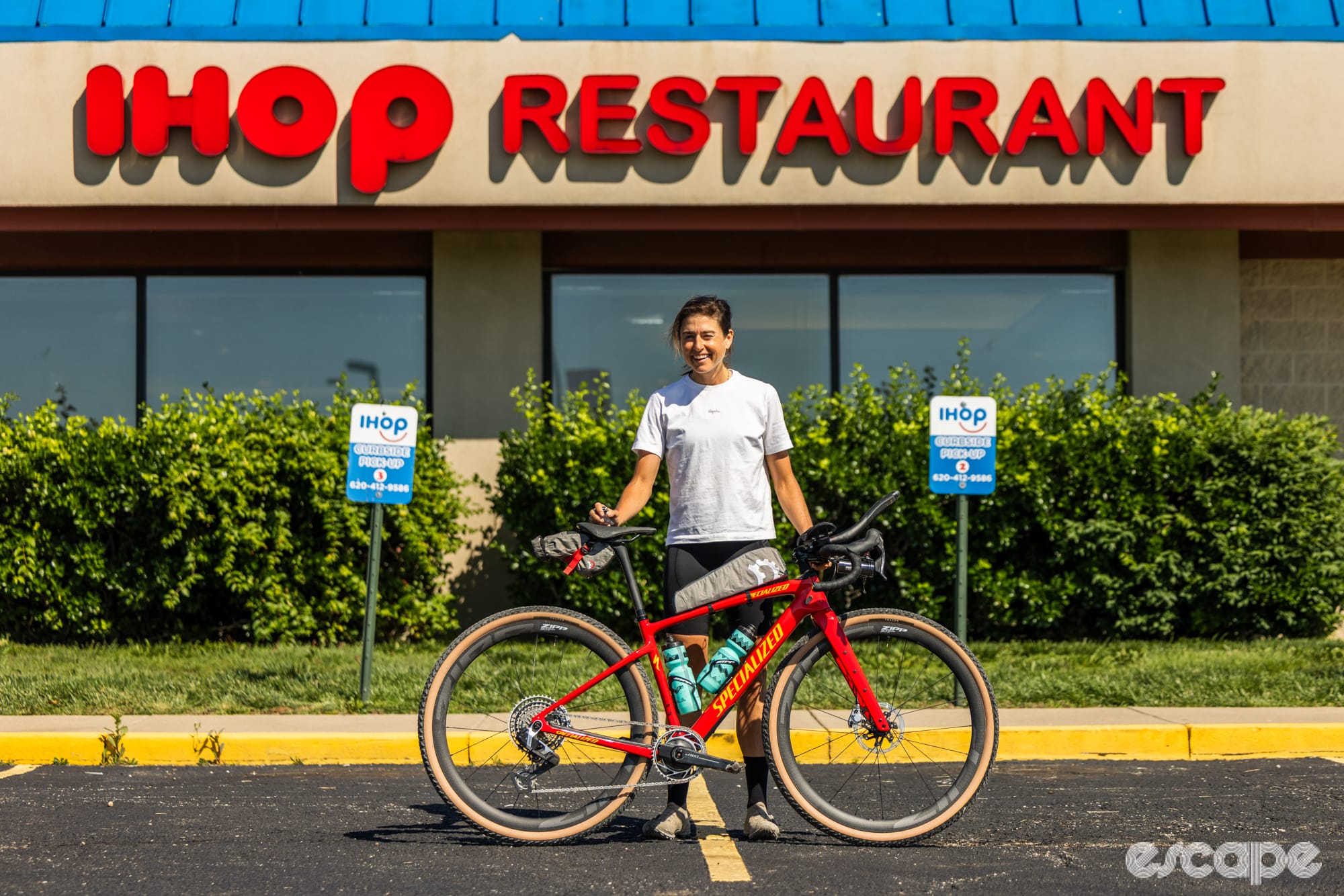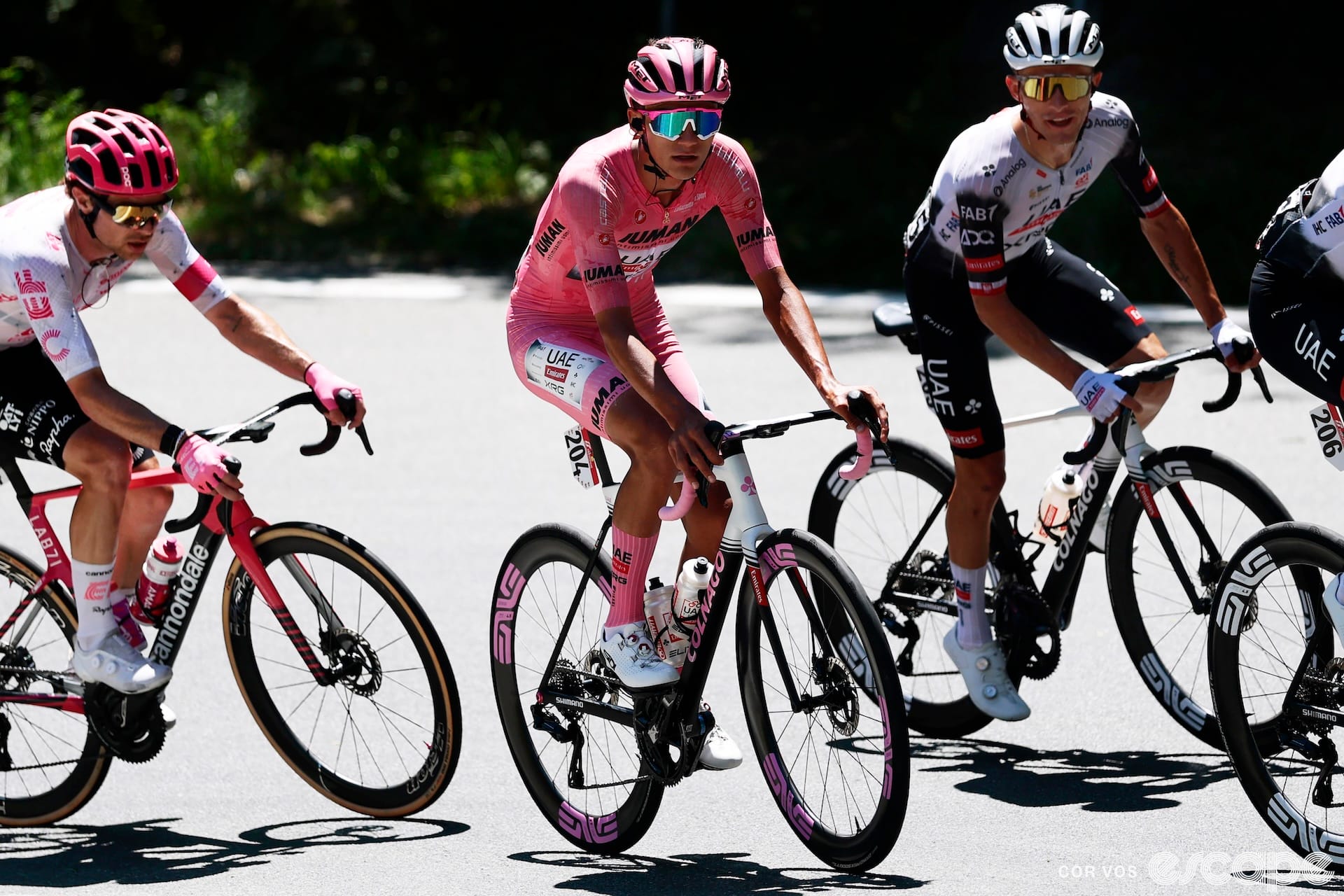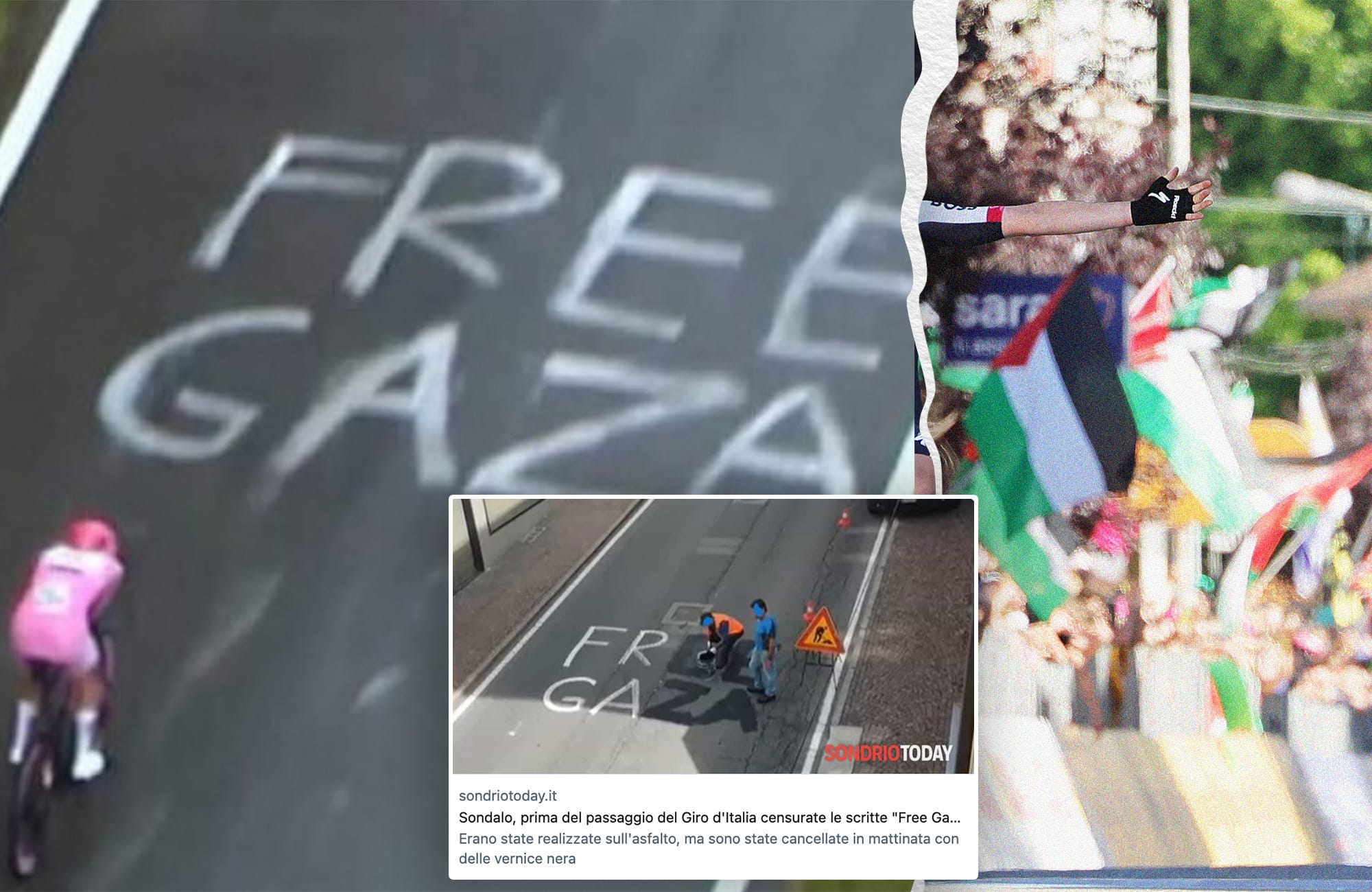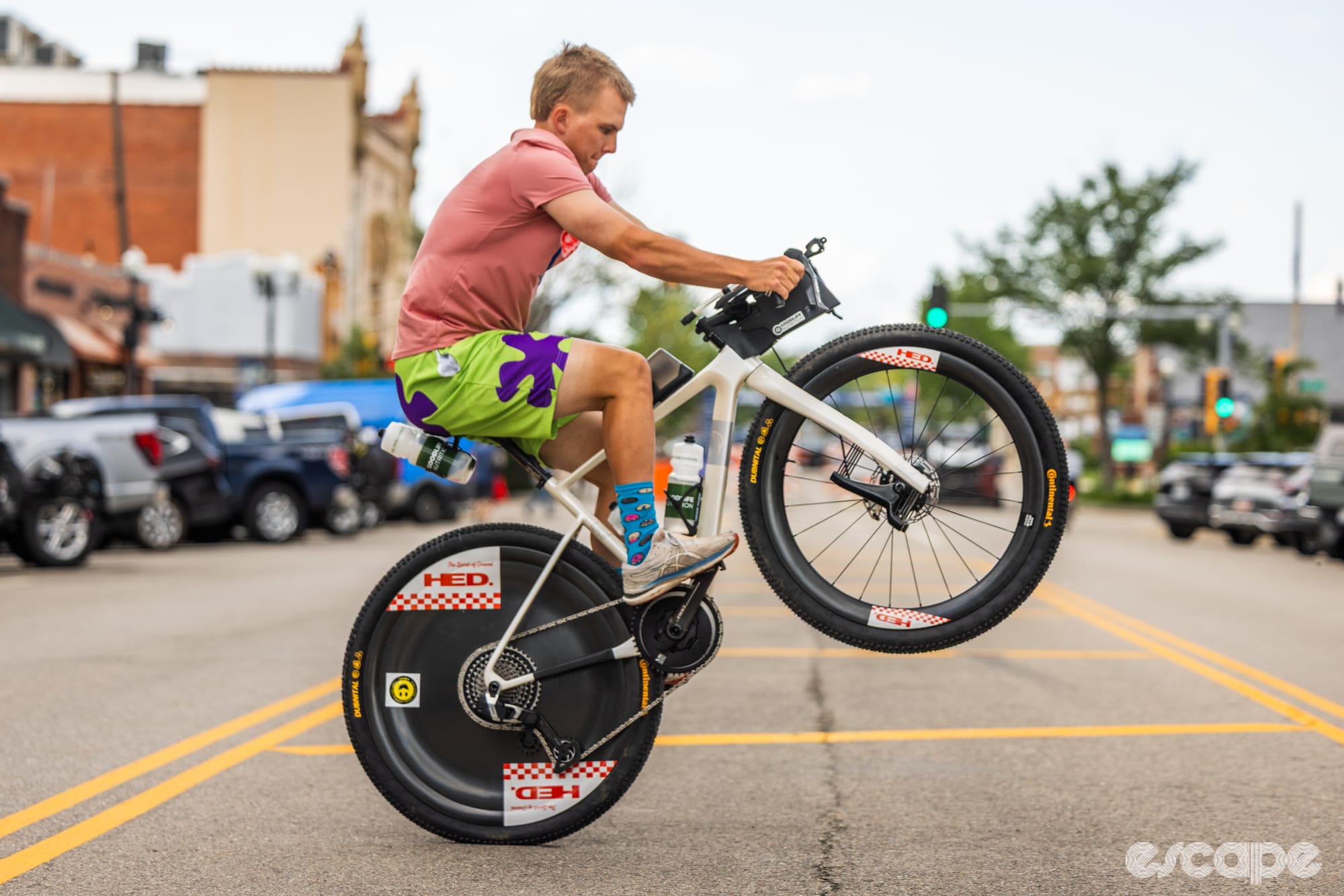It's done, it's happened. Tadej Pogačar is the world champion, meaning the Slovenian has completed the historic Triple Crown: Giro d'Italia, Tour de France and World Championship road race title in one year.
The way he did it was as historic as the achievement itself, the 26-year-old taking off an astonishing 101 km from the finish, first bridging up to the breakaway already strengthened by a counter-move on the previous lap, then going clear with one companion in Pavel Sivakov (France), before going solo with 50 km to go. He looked to be running on fumes in the last lap, but he hung on and won by 34 seconds (after sitting up to celebrate).
The battle for the medals was fierce behind as other big names fought desperately for a result around a minute behind the leader, and while the faster finishers looked at one another, Ben O'Connor (Australia) erupted out of the wheels about 1,500 metres out to solo to second, and Mathieu van der Poel (Netherlands) won the sprint for bronze.
How it happened
- The sun finally shone on Switzerland as the elite men embarked on a 274 km odyssey from Winterthur to Zurich. It was a busy start with dozens of small nations hoping to make the move of the day, until finally six riders established an advantage: Silvan Dillier (Switzerland), Tobias Foss (Norway), Simon Geschke (Germany), Rui Oliveira (Portugal), Piotr Pękala (Poland) and Luc Wirtgen (Luxembourg). Markus Pajur (Estonia) and Roberto Carlos González (Panama) tried to join them, but the pair couldn’t match the pace on the climbs and got stuck in no man’s land.
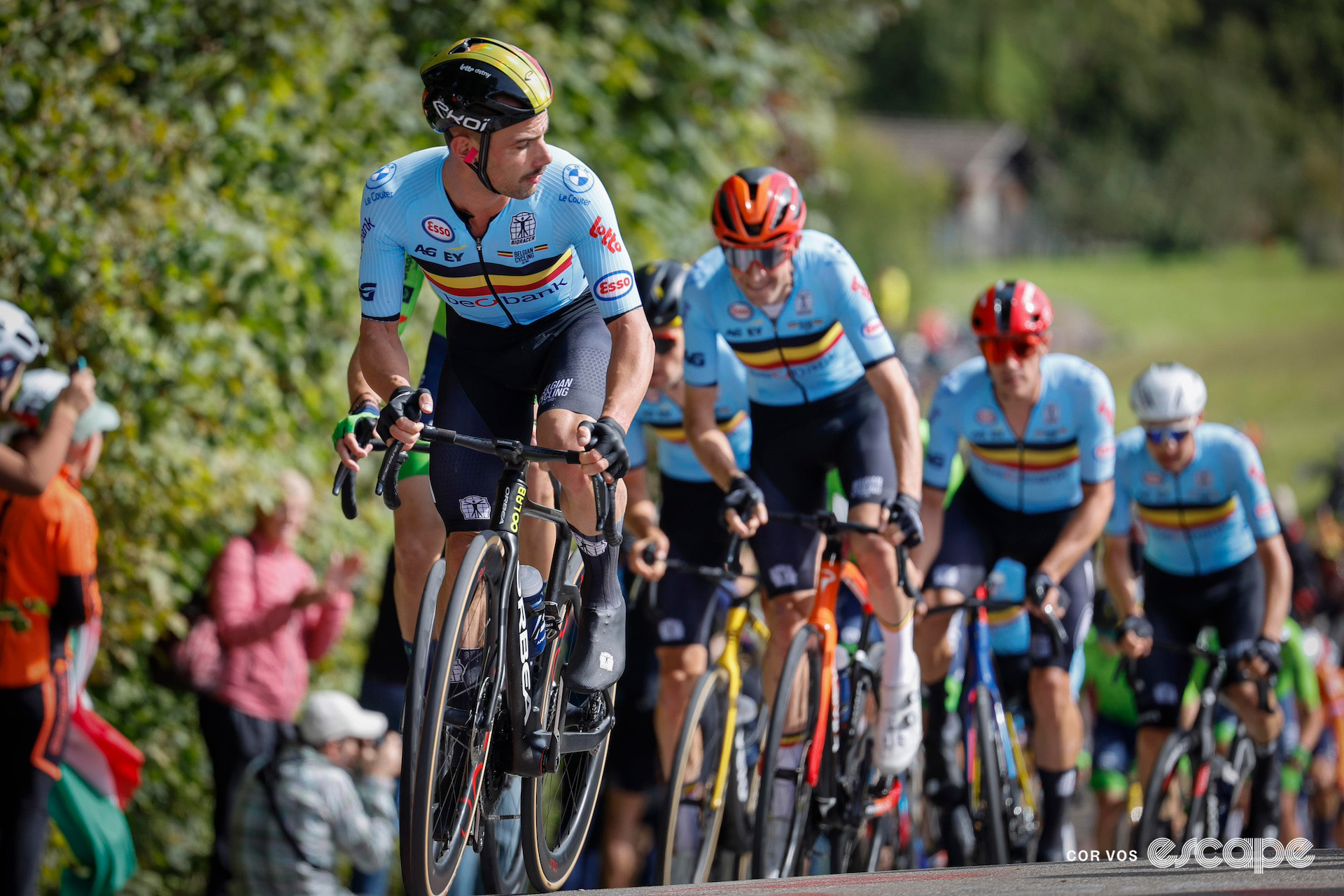
- With Belgium and Slovenia showing their intentions for the two top favourites on the front of the peloton, the gap went out to five and a half minutes before Victor Campenaerts (Belgium) was called on to cut it down.
- There were some unfortunate incidents in the peloton while the race waited to reach cooking temperature: Pello Bilbao (Spain), João Almeida (Portugal) and two-time world champion Julian Alaphilippe (France) all caught up in early crashes, with the latter abandoning immediately with a suspected dislocated shoulder. Almeida wasn't far behind him in stepping off, and Mattias Skjelmose (Denmark) was another of the outside prospects to abandon before the action began.
- Attacks seemed inevitable on the later laps, but with the breakaway still 3:30 up the road, Pablo Castrillo (Spain) took all by surprise with an acceleration on the steep Bergstrasse with almost six whole laps still to go.
- The Spanish revelation of the Vuelta a España was quickly reeled in, but his move marked the initiation of a flurry of accelerations.
- After Mark Donovan (Great Britain) had given it a dig, Jay Vine’s (Australia) acceleration snapped a 10-rider move off the bunch – including Laurens de Plus (Belgium) and Jan Tratnik (Slovenia), two riders from the dominant teams – and they were let go with almost 130 km left to race.
- The ten riders in the chase group quickly built an advantage as the peloton seemed to ease off, and after 25 km, they joined the leaders, tagging them on the steep Bergstrasse early on the Zurich circuit.
- When the peloton arrived at the same point two and a half minutes later, Pogačar was notably positioned in third wheel, while Remco Evenepoel was conspicuously absent, positioned deep in the pack with his Belgian teammates.
- It seemed impossible that Pogačar would attack so far out, but impossible is often where he thrives – he made his move about 101 km from the finish. Quinn Simmons (United States) and Andrea Bagioli (Italy) tried to follow, but no one could hold his pace, and the Slovenian marched into the gap all alone.
- Pogačar was able to join the leaders within 10 km after Tratnik dropped back to help him out, as Belgium desperately worked away at the leaders’ advantage.
- The gap continued to fall as the Pogačar group entered the last three laps (about 80 km left), but Pogačar seemed unfazed with the climbs to come, and sure enough, he attacked again on the Bergstrasse, taking only Pavel Sivakov (France) with him, a trade teammate and buffer to help out in the wind.
- Desperation began to set in behind and when Evenepoel was left isolated with 70 km to go, it was every man for himself as attacks flew in an attempt to gain a footing in a race that seemed to be disappearing up the road. Nearly all the expected contenders were still there, Evenepoel, Van der Poel, Ben Healy (Ireland), with Enric Mas (Spain) looking good too, along with home favourite Marc Hirschi (Switzerland), among others.
- As the cat and mouse continued behind himself and Sivakov, Pogačar finally went solo 51 km from the finish as he left the Frenchman at the foot of the Bergstrasse.
- It must have felt like the longest 50 km of the season, the Giro-Tour champion looking a little ragged as his gap wavered and he negotiated with his team car for the right bottle/gel combo after missing out in the feed zone.
- Taking advantage of their underdog status, Ben Healy and Latvia's Toms Skujiņš – briefly joined by Oscar Onley (Great Britain) – had formed a spirited chase ahead of Van der Poel, Evenepoel et al., but a group of seven came together in the final lap to contest silver: Van der Poel, Evenepoel, Mas, O’Connor, Hirschi, Healy and Skujiņš.
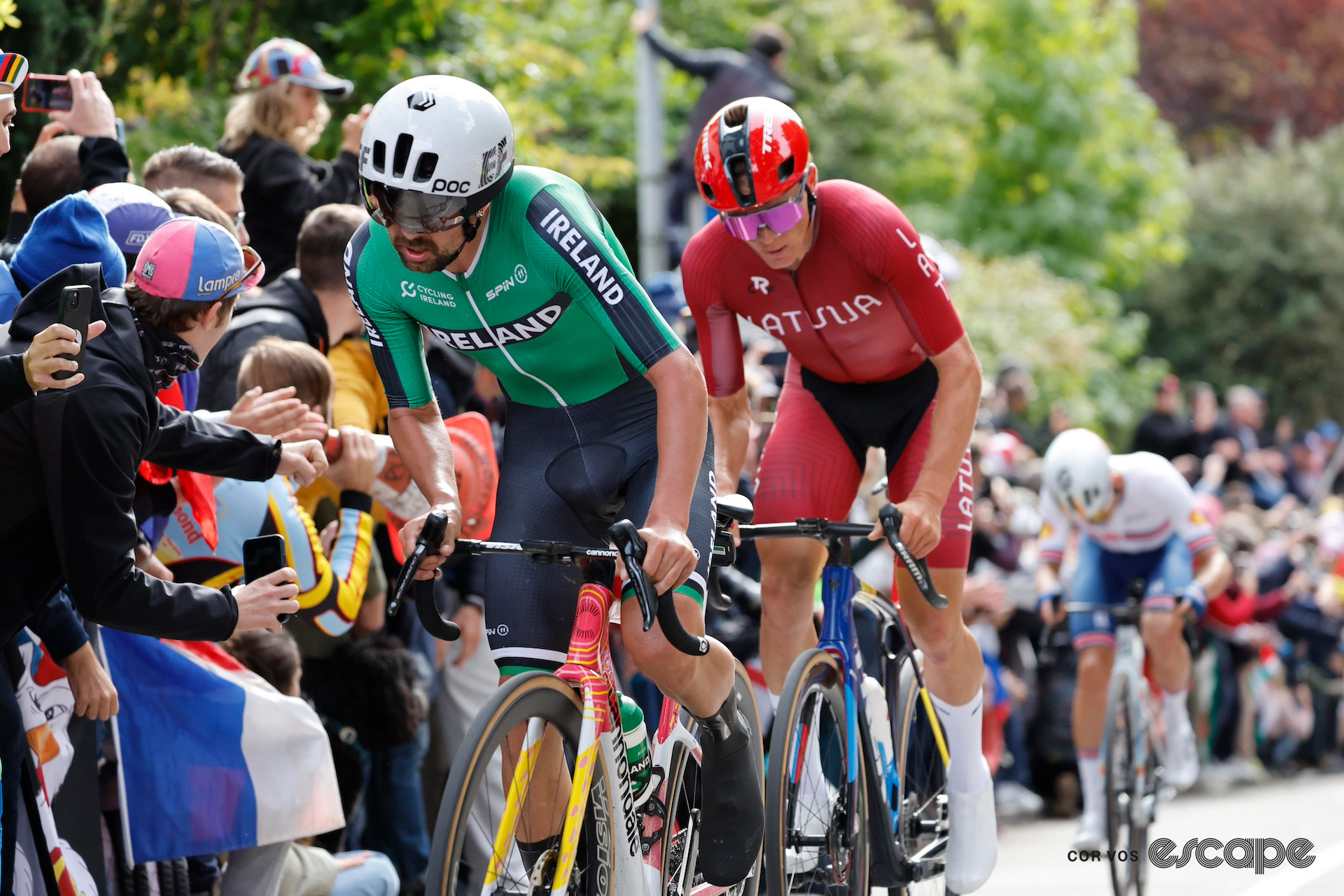
- Pogačar’s advantage continued to yoyo throughout the final lap, including on his favoured uphill gradients, but with 5 km to go, he still held almost 50 seconds. And as the games persisted behind him, he had time to celebrate an extraordinary accomplishment.
- Not willing to wait for the faster men to beat him in a sprint, recent Vuelta runner-up O’Connor launched from the group with 1,500 metres to go and grinned as he crossed the line in silver-medal position, as behind, Skujiņš opened up his sprint early and fast, but Van der Poel had the beating of him to take the last remaining step on the podium.
- Pogačar gains entry to an exclusive club of riders who have won the historic Triple Crown, joining Eddy Merckx and Stephen Roche who achieved the feat in 1974 and 1987 respectively.
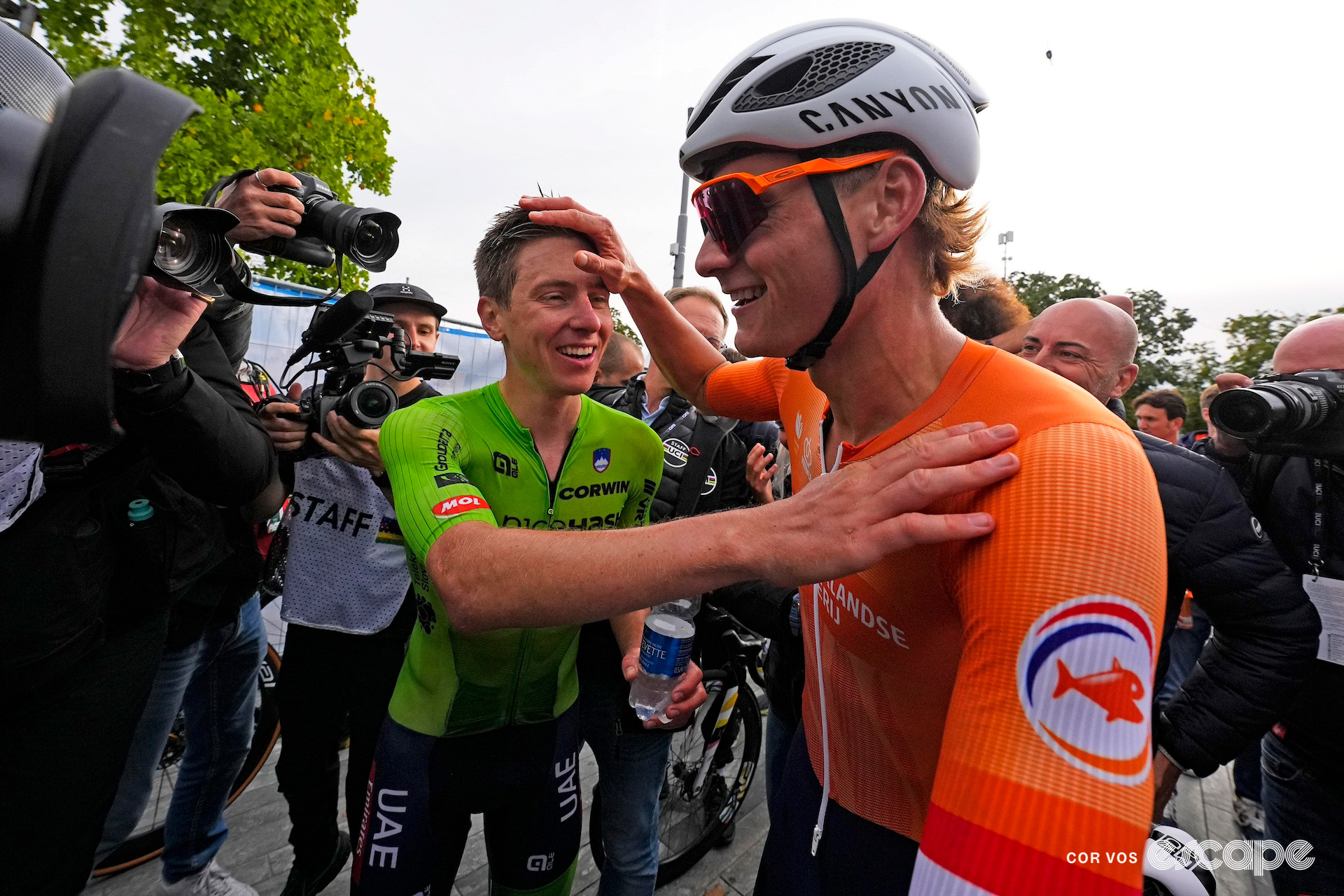
Quotes of the day
A newly sharp and lean Van der Poel was on hand with some great quotes at the start, saying he hoped for good legs and a chaotic finale – double tick – which would play to his strengths. He also had a few words for the top favourite Pogačar.
For me, based on this year, Tadej is the deserved world champion.”
His admiration was equal if not magnified at the finish.
There are not many words for that. When he [Pogačar] went with 100 kilometres to go and when Belgium started riding, I thought he was throwing away his chances. Apparently not. I was a bit surprised. With the check at the back I thought it was not the best move, but he proved the opposite."
Pogačar himself was naturally exhausted after his remarkable race, but he was ready with a pretty thorough debrief when asked, admitting that it hadn't been the plan to let fly so early.
After this kind of season I put a lot of pressure on myself for today. I had pressure from myself, from the team, we came here for the victory, then – I don’t know – the race unfolded pretty quick and there was a dangerous breakaway in the front, and I maybe did a stupid attack, but luckily Jan [Tratnik] was there with me and I just never gave up until the final. It’s an incredible day, I can’t believe what just happened."
O'Connor was not a name many expected to see on the podium in Zurich, but after a canny finale in which he left his rivals to punch and counter-punch, before pouncing in the last couple of kilometres, the Vuelta runner-up earned a coveted World Championship medal to cap off a brilliant season.
I’m very proud, I didn’t see this coming. Credit also to the [Australian] boys. They motivated me, because I didn’t feel super good during the first laps. I needed a pep talk to refocus. At the end I had the right timing to ride to second place.”
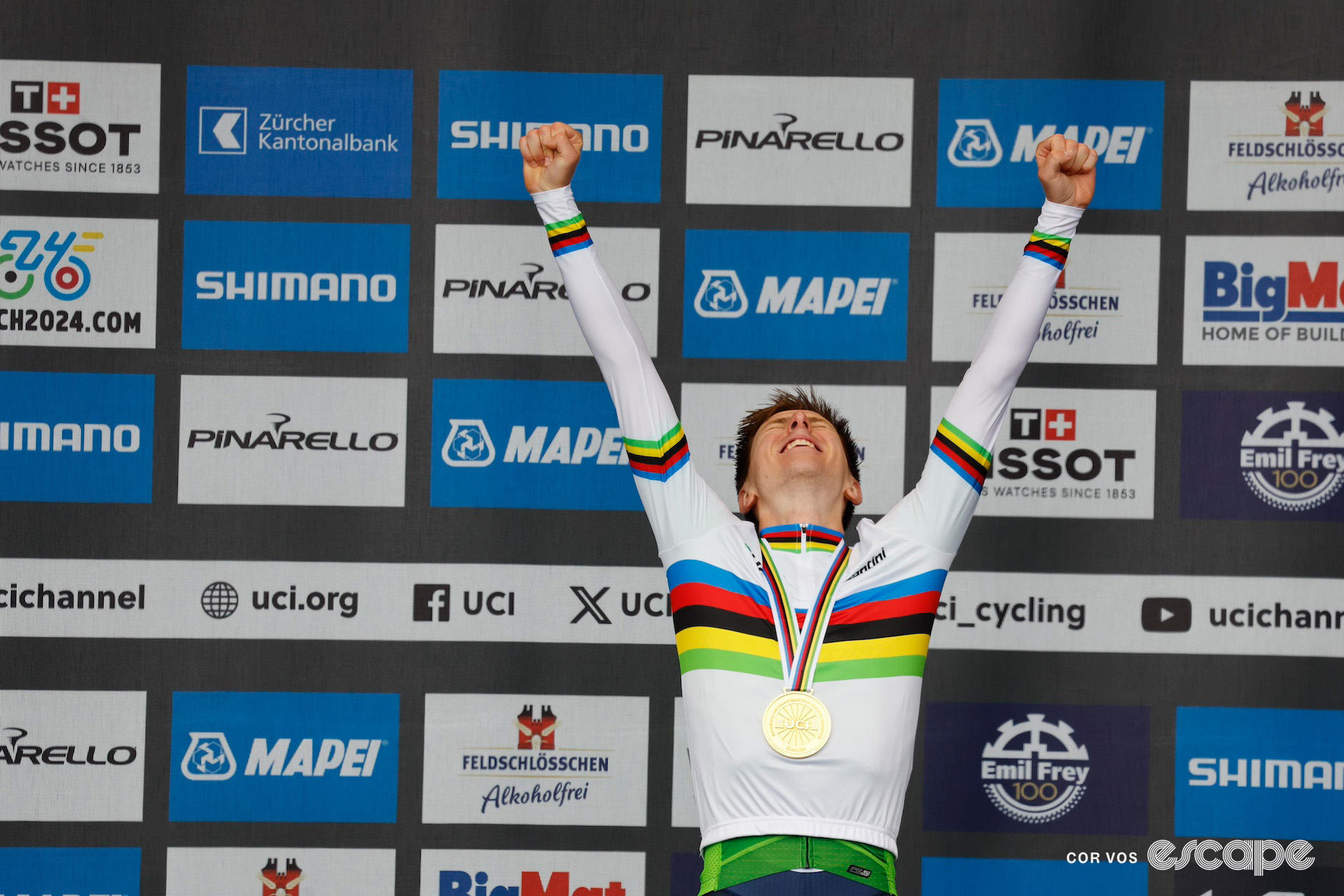
Brief analysis
- An attack with 101 kilometres still to race – and more, considering the mileage counter marks the front of the race – seemed so ludicrous as to be sacrificial for Pogačar. Sure, he'd spent 81 km on the attack at Strade Bianche, but this was the World Championships, a once-in-a-season opportunity to stand out among the highest quality field of the year, so the balance of risk and reward was far more finely tuned. Though the man himself offered the word "stupid" to describe the timing of his move, everything worked out in his favour: his teammate was able to relieve him in the bridging move to the breakaway despite the lack of race radios, so kudos to the roadside helpers who communicated the necessary information; and he could then count on chaos giving way to cat-and-mouse games in the chase behind. Job done.
- It's up for debate whether either Evenepoel or Van der Poel, or both, could have followed Pogačar even if they had been closer to the front on the Bergstrasse, but regardless, that positioning error is the most obvious failure of their respective races. They both admitted afterwards that they were not expecting it, even that they didn't think it was the smartest move given the strength still in the peloton. "I thought it wouldn't happen so early. At that moment I still had strong riders in front," Evenepoel said of his rival's long-range attack, at which point the Olympic champion had been about 20 or 30 riders deep. "I had the feeling that you could still hide on the circuit to save energy and therefore didn't always have to be in the top ten."
Did we do a good job with this story?

